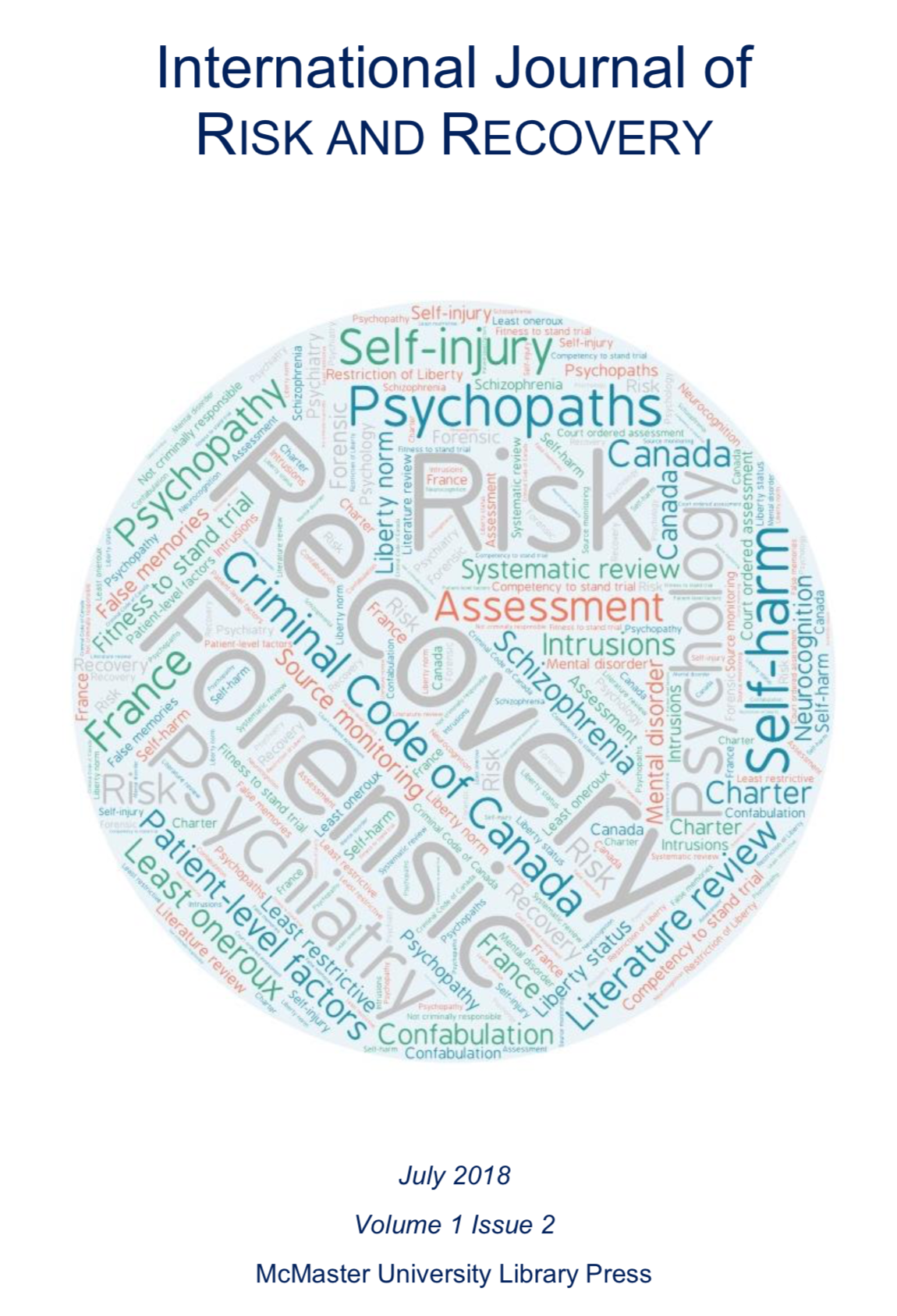A review of patient-level factors related to the assessment of fitness to stand trial
DOI:
https://doi.org/10.15173/ijrr.v1i2.3357Keywords:
Fitness to Stand Trial, Assessment, Competency to stand trial, Criminal Code of Canada, Patient-level factorsAbstract
Under Canadian law, when the issue of fitness to stand trial is raised, a medical professional completes an assessment and provides an opinion of fitness.The Criminal Codedoes not mandate a specific form of fitness assessment, and in the last fifty years, a number of unstructured and structured measures have been created for clinicians’ use. In the last three decades, a multitude of studies have been conducted in the assessment of fitness to stand trial in an attempt to provide a clearer picture of which patient-level factors influence a clinician’s finding of fitness. Previous conclusions on the influence of demographic, psychiatric, criminal, and psycholegal factors have ranged heavily, and research on fitness determinations in Canada is minimal. The purpose of this review is to consolidate the numerous studies to provide an understanding of where future research should be focused so that reliable and valid fitness determinations can be made. Future research should focus on mirroring the unstructured assessments used by clinicians in their studies and then measuring the influence of patient-level factors. Most notably, research should focus on psycholegal factors and their influence on the determination of fitness under the applicable legal standards for fitness across the world.
References
Pozzulo J, Bennell C, Forth A. Forensic psy-chology. 4th Ed. Toronto: Pearson Canada Inc; 2015.
Pilon M. Mental disorder and Canadian crimi-nal law. Canada: Library of Parliament; 2002. (accessed on March 2, 2018)
R. v. Swain (1991) 1 SCR 933. (accessed on March 2, 2018)
Criminal Code of Canada, RSC 1985, c 46. (accessed on March 2, 2018)
Borum R, Grisso T. Psychological test use in criminal forensic evaluations. Prof Psychol Res Pr 1995;26(5):465-73.
Gay JG, Ragatz L, Vitacco M. Mental health symptoms and their relationship to specific deficits in competency to proceed to trial evaluations. Psychiatr Psychol Law 2015; 22(5):780-91.
Steadman H. Beating a rap? Defendants found incompetent to stand trial. Chicago: University of Chicago Press; 1979.
Reich J, Wells J. Psychiatric diagnosis and competency to stand trial. Compr Psychiatry 1985;26(5):421-32.
Rogers R, Gillis JR, McMain S, Dickens SE. Fitness evaluations: A retrospective study of clinical, criminal, and sociodemographic char-acteristics. Can J Behav Sci Can Sci Com-port 1988;20(2):192-200.
Nicholson RA, Kugler KE. Competent and incompetent criminal defendants: A quantita-tive review of comparative research. Psychol Bull 1991;109(3):355-70.
McCallum KE, MacLean N, Neil Gowensmith W. The impact of defendant ethnicity on the psycholegal opinions of forensic mental health evaluators. Int J Law Psychiatry 2015;39:6-12.
Hart SD, Hare RD. Predicting fitness to stand trial: the relative power of demographic, criminal, and clinical variables. Forensic Rep 1992;5(1):53-65.
Robertson RG, Gupton T, McCabe SB, Bank-ier RG. Clinical and Demographic Variables related to “fitness to stand trial” assessments in Manitoba. Can J Psychiatry 1997;42(2):191-5.
Rosenfeld B, Wall A. Psychopathology and competence to stand trial. Crim Justice Be-hav 1998;25(4):443-62.
Pirelli G, Gottdiener WH, Zapf PA. A meta-analytic review of competency to stand trial research. Psychol Public Policy Law 2011; 17(1):1-53.
Kois L, Pearson J, Chauhan P, Goni M, Saraydarian L. Competency to stand trial among female inpatients. Law Hum Behav 2013; 37(4):231-40.
Cooper VG, Zapf PA. Predictor variables in competency to stand trial decisions. Law Hum Behav 2003;27(4):423-36.
Daniel A, Beck N, Herath A, Schmitz M, Menninger K. Factors correlated with psychi-atric recommendations of incompetency and insanity. J Psychiatry Law 1985;12:527-44.
Viljoen JL, Zapf PA, Roesch R. Diagnosis, current symptomatology, and the ability to stand trial. J Forensic Psychol Pract 2004;3(4):23-37.
Viljoen JL, Roesch R, Zapf PA. An examina-tion of the relationship between competency to stand trial, competency to waive interroga-tion rights, and psychopathology. Law Hum Behav 2002; 26(5):481-506.
Schreiber J, Green D, Kunz M, Belfi B, Pe-queno G. Offense characteristics of incompe-tent to stand trial defendants charged with vi-olent offenses: characterizing IST defend-ants. Behav Sci Law 2015;33(2-3):257-78.
Lee E, Rosner R, Harmon R. Mental illness and legal fitness (competence) to stand trial in New York State: expert opinion and crimi-nal defendants’ psychiatric symptoms. J Fo-rensic Sci 2014;59(4):1008-15.
Heller M, Traylor W, Ehrlich S, D Lester. Intelligence, psychosis, and competency to stand trial. Bull Am Acad Psychiatry Law 1981;9(4):267-74.
Ryba NL, Zapf PA. The influence of psychiat-ric symptoms and cognitive abilities on com-petence-related abilities. Int J Forensic Ment Health 2011;10(1):29-40.
Dusky v United States (1960) 362 US 402. (accessed on March 2, 2018)
Warren JI, Rosenfeld B, Fitch WL, Hawk G. Forensic mental health clinical evaluation: an analysis of interstate and intersystemic dif-ferences. Law Hum Behav 1997;21(4):377-90.
Roesch R, Eaves D, Sollner R, Normandin M, Glackman W. Evaluating fitness to stand trial. Int J Law Psychiatry 1981;4(1-2):145-57.
Nicholson RA, Johnson WG. Prediction of competency to stand trial: contribution of demographics, type of offense, clinical char-acteristics, and psycholegal ability. Int J Law Psychiatry 1991;14(3):287-97.
Zapf PA, Roesch R. A comparison of the MacCAT-CA and the FIT for making determi-nations of competency to stand trial. Int J Law Psychiatry 2001;24(1):81-92.
Published
How to Cite
Issue
Section
License
Copyright Notice
Authors who publish with this journal agree to the following terms:
- Authors retain copyright of their work and grant the International Journal of Risk and Recovery the right of first publication with the work simultaneously licensed under a Creative Commons Attribution License. This allows others to share the work with an acknowledgement of the work’s authorship and initial publication in this journal.
- Authors are able to enter into separate, additional contractual arrangements for the non-exclusive distribution of the journal’s published version of the work (e.g., post it to an institutional repository or publish it in a book) with an acknowledgement of its initial publication in this journal.
- Authors are permitted and encouraged to post their work online (e.g., in institutional repositories or on their websites) before and during the submission process as it can lead to productive exchanges, as well as earlier and greater citation of published work. (See The Effect of Open Access.)

